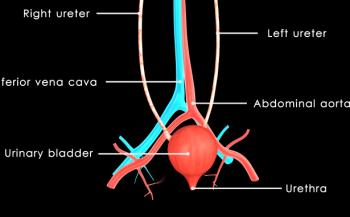
The promising results of a phase 1 immunotherapy trial marks the first major advance in the treatment of advanced bladder cancer for 30 years.
The result marks the first major advance in the treatment of advanced bladder cancer for 30 years, note the researchers, who report their findings in the journal Nature.
The research team at Barts Cancer Institute, Queen Mary University of London in the United Kingdom (UK), says:
"This study is a hugely exciting step forward in the search for alternative advanced bladder cancer treatment.
For decades chemotherapy has been the only option, with a poor outcome and many patients too ill to cope with it."
The researchers conducted a trial of Roche's experimental cancer immunotherapy drug MPDL3280A - an antibody that blocks PD-L1 - a protein that is believed to help cancer cells evade immune detection.
Promising results prompts FDA to assign drug 'breakthrough therapy designation status'
The research team says not only did the drug show striking results, but it will also be possible to target the therapy by screening for PD-L1 protein.
The early results of the trial are so promising that the Food and Drug Administration (FDA) have granted the investigational drug "breakthrough therapy designation status," he adds.
The researchers believe if the findings are confirmed in larger trials, then the drug can be fast-tracked through development and approval and bring hope to the thousands of people that are diagnosed with advanced bladder cancer every year.
According to the American Cancer Society (ACS), bladder cancer is the fourth most common cancer among American men, who are about three to four times more likely to develop the disease than women. The chance that men will develop bladder cancer over their lifetime is about 1 in 26 - in women it is about 1 in 90.
The ACS estimates that in 2014, over 74,500 people in the US will discover they have bladder cancer, and over 15,500 will die of the disease.
In the United Kingdom, where the trial was conducted, bladder cancer is the 7th most common cancer and 1 in 10 cases are diagnosed when the cancer is metastatic - that is so advanced that it has spread to another part of the body.
Like many cancers, once bladder cancer is advanced it is very difficult to treat, and chemotherapy is currently the only option. On average, people with advanced bladder cancer only survive for a year to a year and a half after diagnosis, and many choose not to have chemotherapy because the chances of survival are so poor compared to the toxic side effects.
Tumors shrank in 52% of PD-L1-positive patients after 12 weeks
The trial was a phase 1 trial - that is one that focuses primarily on a drug's safety and how patients respond to it - and was conducted at several centers in different countries.
Altogether, the trial enrolled 68 patients with advanced bladder cancer that had not responded to all other standard treatments such as chemotherapy.
All patients were given the experimental cancer immunotherapy drug MPDL3280A. Screening also showed about 30 patients had PD-L1-positive tumors.
After 6 weeks of treatment, results showed tumors had shrunk in 43% of PD-L1-positive patients. This figure rose to 52% at the 12-week follow-up, and scans found no traces of cancer in two (7%) of the patients.
Among the PD-L1-negative patients, 11% responded to the treatment.
The researchers note that in the group that responded to treatment, patients found the benefits were prolonged. The safety data also looked encouraging: fatigue and loss of appetite were the most common side effects reported.
The same issue of Nature also contains a report by Yale researchers of another broader set of results from the same phase 1 trial of MPDL3280A. That study shows that patients with lung, kidney, colon or head and neck cancers also responded to the drug.
References:
1. MPDL3280A (anti-PD-L1) treatment leads to clinical activity in metastatic bladder cancer, Thomas Powles et al., Nature, published online 26 November 2014, doi:10.1038/nature13904, abstract.2. Predictive correlates of response to the anti-PD-L1 antibody MPDL3280A in cancer patients, Roy S. Herbst et al, Nature, published online 26 November 2014, doi:10.1038/nature14011, abstract.
No comments:
Post a Comment